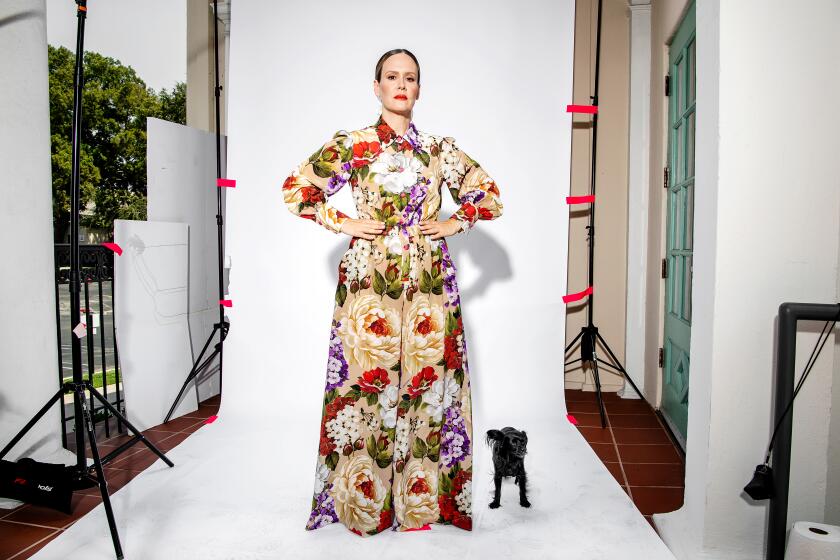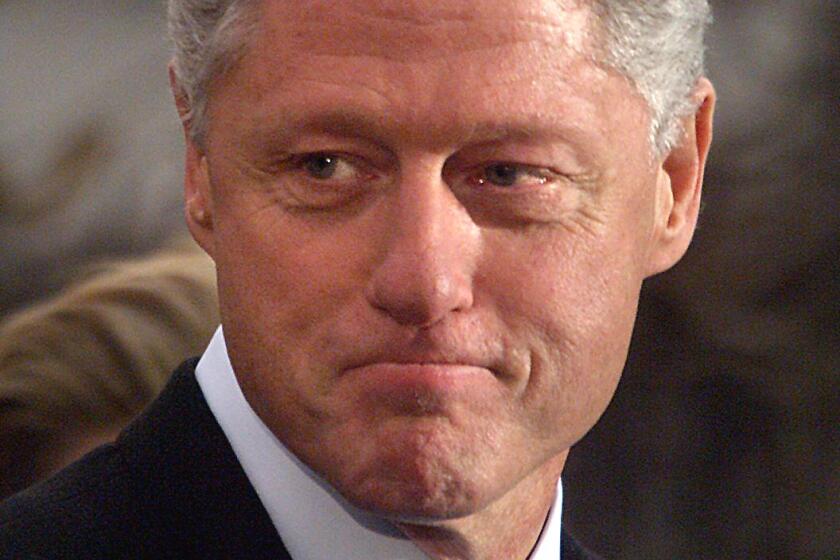The women of ‘Impeachment’ explained: Linda Tripp and Kathleen Willey
- Share via
The first episode of “Impeachment: American Crime Story,” which premiered Tuesday on FX, wastes little time in reminding viewers of Linda Tripp’s betrayal of Monica Lewinsky. It opens on the day that betrayal came to a head, Jan. 16, 1998, at the food court of the Pentagon City mall — when FBI agents, accompanying Tripp, confronted Lewinsky about the nature of her relationship with then-President Clinton, setting off one of the biggest political scandals in American history.
The third season of the anthology series, which has already taken on the trial of O.J. Simpson and the murder of fashion designer Gianni Versace, revisits the sex scandals that plagued Clinton’s presidency and the events that led to his impeachment in 1998, including his interactions with Lewinsky (Beanie Feldstein) and a sexual harassment lawsuit filed against the president by Paula Jones (Annaleigh Ashford).
But Episode 1 of the star-studded limited series, titled “Exiles,” primarily functions as a portrait of Tripp’s deep reverence for her job and the patriotic pride she felt working in the White House — and how she felt that was threatened under the Clinton administration.
“I was so fascinated by this idea of, ‘Oh, this is a person who is in an office and no one even knows she’s there. She’s a person who tells people to use staples, not paperclips,’” Paulson, who plays Tripp in the series, told The Times. “In [the podcast ‘Slow Burn: The Clinton Impeachment’], Linda talks about the way you would write on White House stationery — all that stuff, the rituals of that and the institutional protocols, were very appealing to her and mattered deeply to her. And it was a sign of respect to know them well and to execute them with dignity and integrity.”
After reclaiming Marcia Clark, the actor expected her latest role to change minds about ‘the most hated woman in America.’ She may have miscalculated.
The New Jersey native began her secretarial career in the late ’60s working in Army Intelligence at Ft. Meade, Md. While married to her first husband, a military officer named Bruce Tripp, Linda took on secretarial jobs that were amenable to his duties in Europe. For a time, she had top-secret security clearance doing secretarial work for Delta Force, a highly secret counterterrorist unit.
As her marriage began to unravel, Tripp joined the White House of George H.W. Bush in April 1990 with the help of a friend who worked there as a correspondence analyst. Tripp started out as a floater, filling in where secretarial work was needed. An admirer of the Bushes, Tripp was kept on after Clinton was inaugurated in 1993.
And, as depicted in the episode, Tripp was one of the last people to see Clinton legal aide Vince Foster alive before he killed himself in July 1993 while embroiled in political scandal. After the news of Clinton and Lewinsky’s sexual relationship became a national sensation, The Times reported on Tripp’s connection to Foster, noting that Tripp brought Foster a hamburger and some candy from the White House cafeteria the day of his death: “Shortly after that lunch, Foster told Tripp, ‘I’ll be back,’ and then drove to a Northern Virginia park overlooking the Potomac River, where he shot himself.”
For head writer and executive producer Sarah Burgess, finding her way into Tripp’s head came from hours of reading and listening. Her sources included Ken Gormley’s 2011 book “The Death of American Virtue: Clinton vs. Starr,” as well as an article by Jane Mayer, “Portrait of a Whistleblower,” that was published in the New Yorker in 1998.
At its heart, “Impeachment: American Crime Story” is a story of human foibles. But you may need a timeline to keep straight key developments in the saga.
“There was a real quote from Linda where she had seen that [First Lady] Hillary [Clinton] used the multistall ladies room in the West Wing and... said to her colleague, ‘Mrs. Bush would rather be catheterized than use a public restroom.’ And everything about that quote said so much about Linda,” Burgess said. “First of all, the use of ‘catheterized’ is the least necessary word choice I’ve ever heard in my life. And she’s 100% name-dropping, and she’s doing it in a way where she’s judging Hillary, obviously. I just feel in that sentence the delight of the knowingness, because she was in an incredibly exclusive place... I detected how important it seemed to her to be in that place to make that judgment on Hillary Clinton and everything. It suggested so much about the character.”
A version of that encounter — in which Hillary Clinton, played by Edie Falco, exchanges a greeting with Tripp while fixing her lipstick in the bathroom mirror — is featured in the episode, as is Tripp’s line comparing the first lady to Barbara Bush. She utters it to another, lesser-known figure in the impeachment saga: Kathleen Willey (Elizabeth Reaser), a former Clinton campaign worker and White House volunteer who later alleged that President Clinton groped her during a November 1993 meeting at the White House. Along with Jones and fellow Clinton accuser Juanita Broaddrick, Willey attended a campaign event alongside then-presidential candidate Donald Trump in 2016 shortly before his second debate with opponent Hillary Clinton.
In “Exiles,” Willey, disheveled, bumps into Tripp outside the Oval Office, asks to borrow her lipstick and describes the president kissing her during a meeting to ask for a full-time job. “What did you do?” Tripp asks. (In August 1997, Tripp told Newsweek reporter Michael Isikoff about the run-in, claiming that Willey’s “face was red, and her lipstick was off. She was flustered, happy and joyful.”)
By the end of the episode, Willey has secured a job with the Clinton administration, while Tripp, who departed the White House in August 1994, has been transferred to the Pentagon. It’s there that Tripp would meet and befriend Lewinsky after the former White House intern’s own transfer there in April 1996.
The third season of Ryan Murphy’s limited drama chronicles the impeachment through the eyes of the women involved: Monica Lewinsky, Linda Tripp and Paula Jones.
“You know, I was a good soldier when the election happened and these people showed up with their total lack of respect for this institution and their obvious contempt for half the country,” Tripp complains to Willey in “Exiles,” suggesting that Willey was only hired because of Clinton’s alleged sexual interest in her.
“The president has no idea who you are,” Willey retorts.
Call it foreshadowing.
More to Read
The complete guide to home viewing
Get Screen Gab for everything about the TV shows and streaming movies everyone’s talking about.
You may occasionally receive promotional content from the Los Angeles Times.









